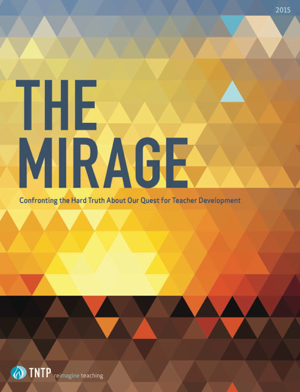Nov. 27, 2015
Here’s a question you can ponder while you’re sitting quietly digesting the turkey leftovers:
Do you remember having a teacher you really connected with and learned so much from? Were there others in the class that did not have such an experience? Or were you the one who didn’t think much of that teacher, but you could see that other children really did?
 Such personal stories might help us put a different spin on last month’s spat over teacher professional development spending.
Such personal stories might help us put a different spin on last month’s spat over teacher professional development spending.
A study titled “The Mirage” was published by TNTP, the Brooklyn based organization founded in 1997 under the name The New Teacher Project. (The group has done contract work for CMS in reshaping its professional development department.)
“The Mirage” called into question much of what is in place today that’s designed to grow teachers’ skills. Districts are spending 6%-9% of their annual budgets on professional development. Teachers spend the equivalent of one year out of every 10 on these activities. The cost per teacher in the studied districts was $18,000 per year per teacher. But teachers’ skills are not improving with the investment, according to the study:
“Most teachers’ performance does not appear to improve substantially from year to year, especially after their first few years in the classroom. Too many peak before they master core instructional skills. And when teachers do improve, we could not trace that growth to systemic development strategies.”
Nonprofit executive Andy Smarick wrote in Education Next that his first reaction was to call for a full re-examination of professional development. “But now I’m not so sure, because I don’t think we’re clear about the target at which it should be aimed – what it means to be that great, improving educator.”
That brought a reply from Daniel Weisberg, who heads the group that published “The Mirage.”
“The root of the problem here,” Weisberg wrote, “is our collective failure to even try to measure the impact professional development has on teacher performance in the first place…. We still need school systems to ask the basic questions that these measures could help answer: Is the professional development you’re providing actually helping teachers improve?”
Former students who remember the impact of real teachers on their lives should be forgiven if they think this kind of analysis is narrow and self-serving.
There is no single definition of a great teacher. And there is no dataset that will necessarily predict the outcomes that real teachers have on real students.
Of course there are many skills and baskets of knowledge that will be useful to a teacher. But let’s go back to our personal recollections. The same teacher may connect with some students but not others. Perhaps that tells us something important about the peril of creating a single definition of “what it means to be that great, improving educator” – much less depending on a single dataset to identify what helps teachers improve.
One of my favorite standards in this regard is to celebrate and reward the teacher who can reach the student who chooses to sit in the dark, or in the back of the room. Can that gift be nurtured through professional development?
![]()
